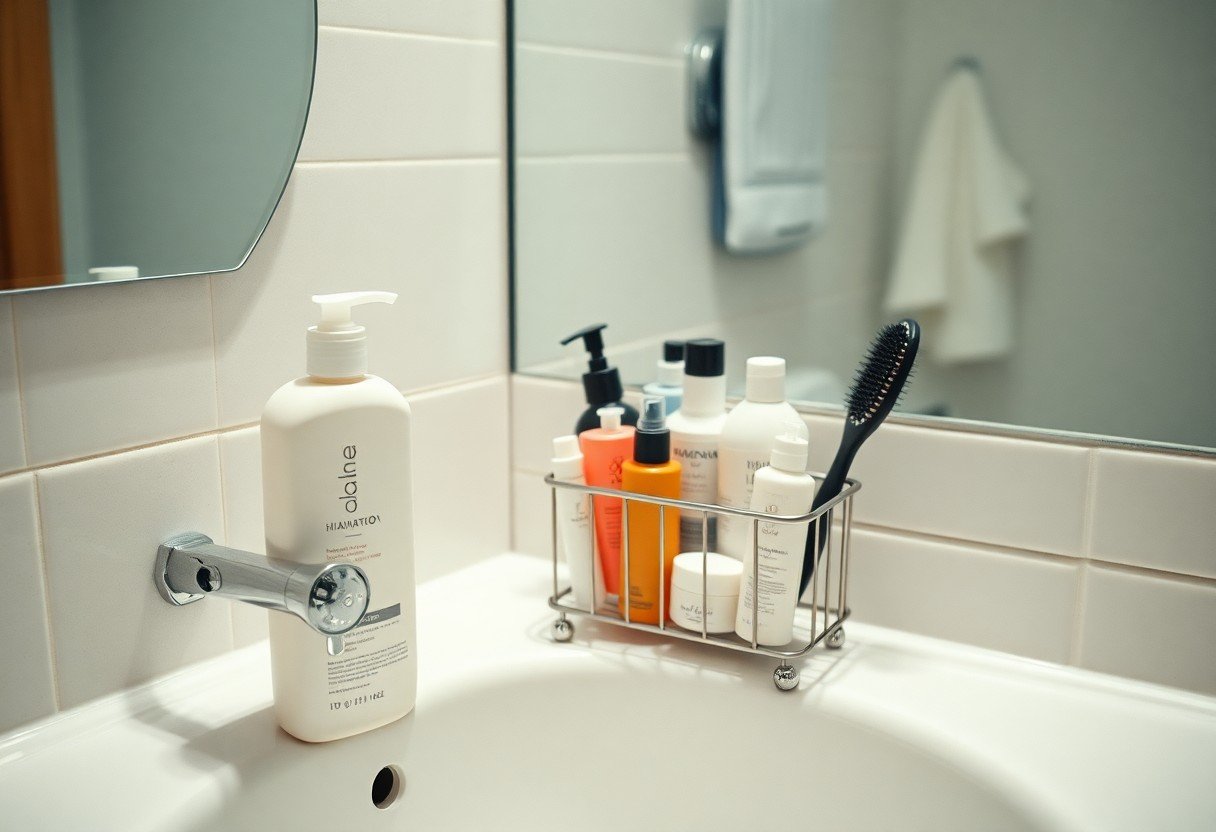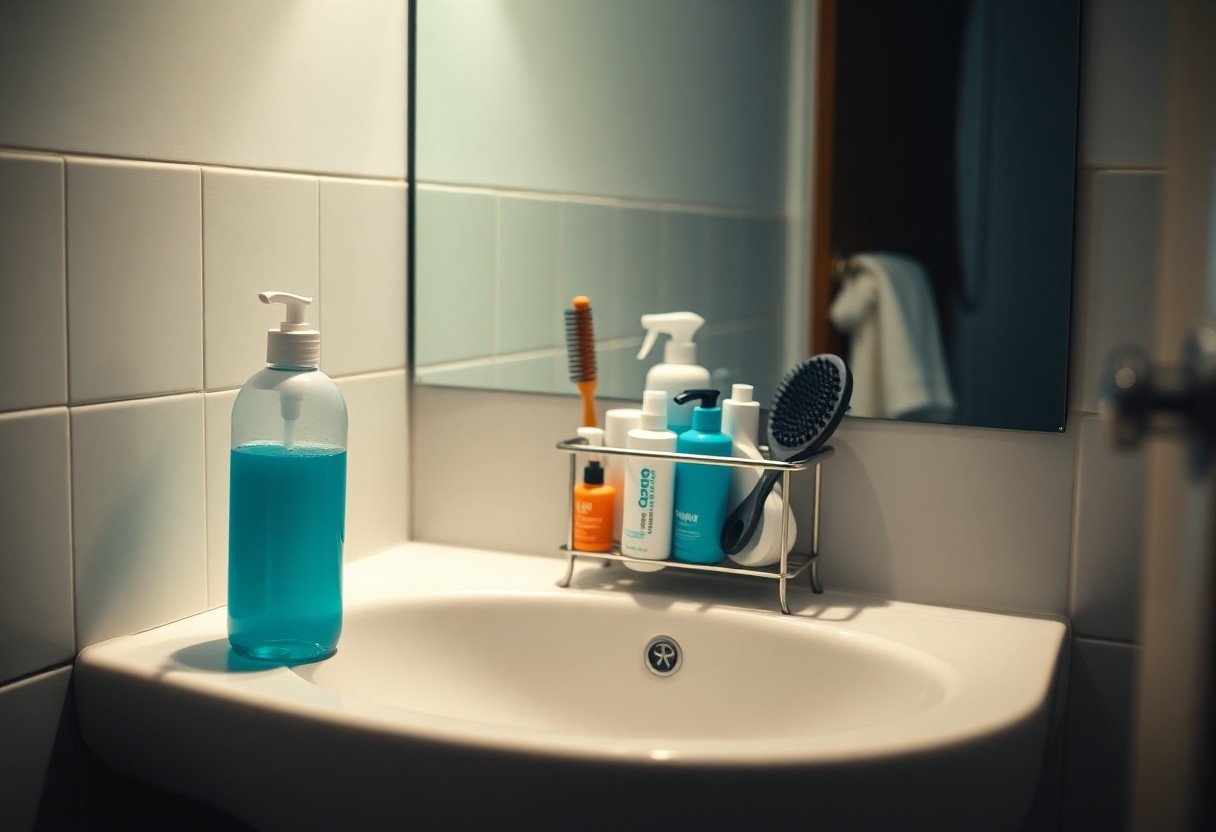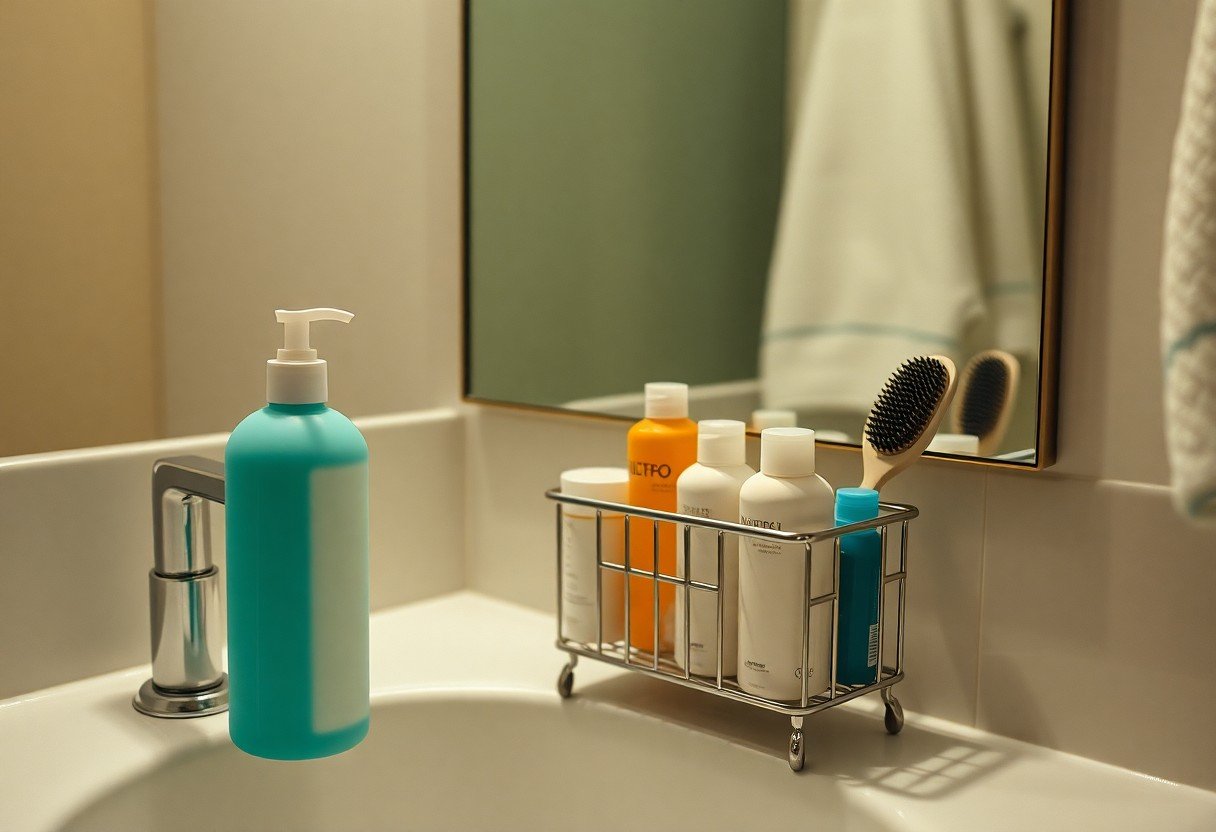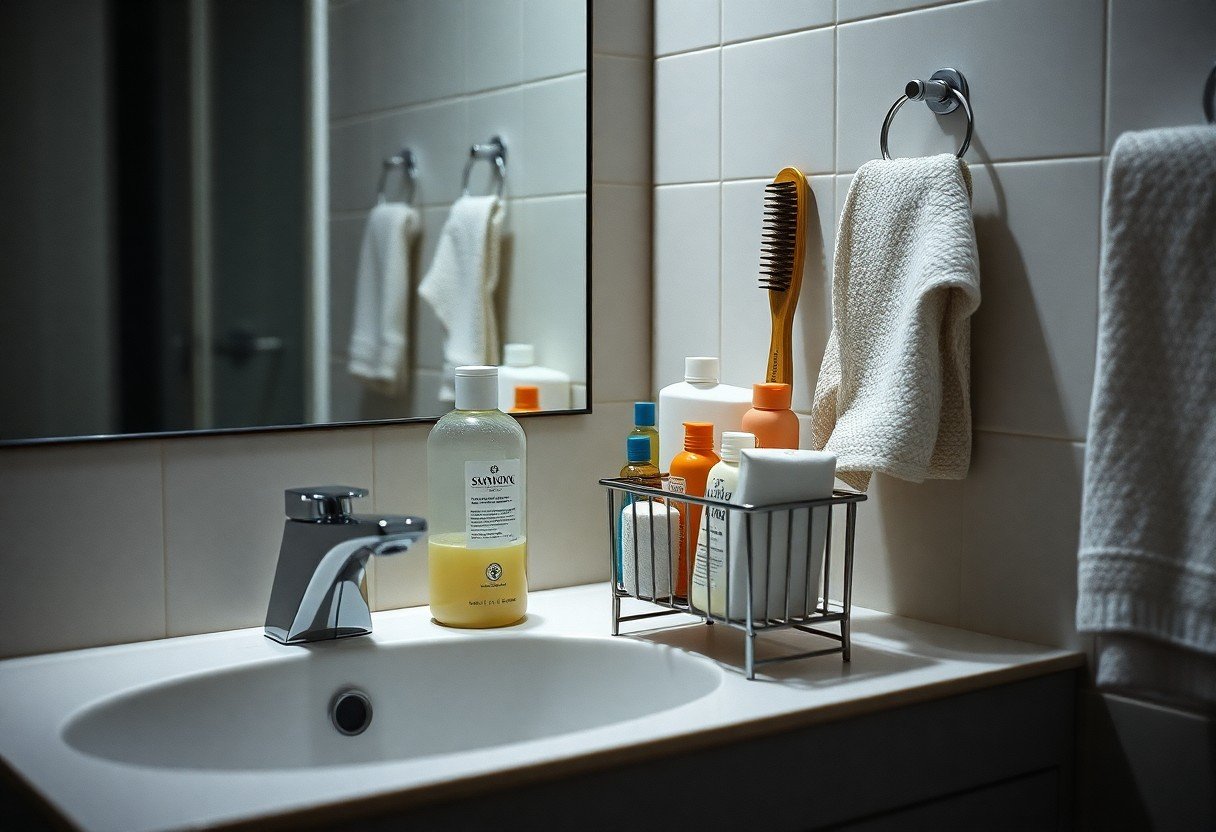Overwashing your hair with shampoo daily might be doing more harm than good to your scalp and strands. While you might think daily washing keeps your hair clean, it can actually strip away vital natural oils that protect and nourish your hair. Your scalp responds by producing excess oil to compensate, creating a cycle that makes your hair appear greasier faster. Understanding your hair type and its unique needs will help you determine the ideal washing frequency, which for most people is 2-3 times per week.
Understanding Shampoo
To effectively care for your hair, you need to understand what shampoo actually does. Shampoo is a specialized cleansing product designed to remove dirt, oil, and debris from your hair and scalp. Modern shampoos contain a combination of surfactants, conditioning agents, and preservatives that work together to clean and protect your hair.
How Shampoo Works
Works by using surfactants that break down oils and dirt in your hair. These molecules have both water-loving and oil-loving properties, allowing them to trap and wash away unwanted substances. When you rinse, the surfactants carry away the dirt and excess oils, leaving your hair clean and refreshed.
Types of Shampoo
- Clarifying shampoo for deep cleaning
- Moisturizing shampoo for dry hair
- Volumizing shampoo for fine hair
- Color-safe shampoo for dyed hair
- Any shampoo choice should match your specific hair type and concerns.
| Shampoo Type | Best For |
|---|---|
| Clarifying | Product buildup removal |
| Moisturizing | Dry, damaged hair |
| Volumizing | Fine, limp hair |
| Color-safe | Dyed hair protection |
| Anti-dandruff | Scalp conditions |
For instance, each type of shampoo serves a unique purpose in hair care. Sulfate-free formulas are gentler on your scalp, while medicated shampoos can treat specific conditions. Understanding your hair’s needs helps you choose the right product for optimal results. Any selection should be based on your hair type, condition, and specific concerns.

Factors to Consider
While determining your ideal hair washing frequency, several key elements need careful evaluation.
- hair type and texture
- scalp condition
- daily activities
- environmental exposure
Though these factors work together to influence your optimal shampooing routine.
Hair Type
Type of hair you have significantly impacts your washing schedule. Fine hair typically needs daily washing as it gets oily quickly, while thick or coarse hair can go longer between washes. Your hair’s natural oil distribution varies based on its texture, making it imperative to adjust your routine accordingly.
Scalp Condition
Assuming your scalp’s health directly affects your hair care needs. Oily scalps might require daily cleansing, while dry, sensitive scalps benefit from less frequent washing. You’ll need to monitor how your scalp responds to different washing frequencies.
The balance of your scalp’s microbiome plays a vital role in overall hair health. Over-washing can disrupt natural oil production, while inadequate cleansing may lead to buildup and irritation. You should pay attention to how your scalp feels and looks after washing to determine the right frequency.
Lifestyle and Environment
To maintain healthy hair, consider your daily activities and surroundings. Regular exercise, high humidity, or polluted environments may require more frequent washing, while sedentary lifestyles in controlled environments might need less.
Hair care needs change based on your exposure to different elements. Swimming, heavy sweating, or working in dusty conditions can necessitate daily washing. You should adjust your routine based on your lifestyle factors while being mindful of not stripping your hair’s natural oils.

How to Determine Frequency
Keep in mind that finding the right hair washing frequency depends on multiple factors. Your scalp’s oil production, lifestyle, and hair type all play significant roles. While some people benefit from daily washing, others might experience dryness and damage from overwashing. The key is to observe your hair’s response and adjust accordingly.
Assessing Your Hair Needs
Now take a closer look at your hair and scalp condition. If your scalp feels itchy or oily within 24 hours after washing, you might need daily cleansing. However, if your hair feels dry and brittle, you should reduce washing frequency. Consider factors like your activity level, climate, and styling product usage to determine your optimal washing schedule.
Conducting a Hair Wash Routine
Little changes in your washing technique can make a big difference. Start by testing different intervals between washes, perhaps every other day or every three days. Monitor how your hair responds, paying attention to oil production, scalp comfort, and overall hair health.
Assessing your results requires patience and consistency. Keep a simple hair diary for two weeks, noting how your hair feels each day. If you notice excessive oiliness, scalp irritation, or unusual hair fall, adjust your washing frequency. The ideal routine should leave your hair feeling clean and healthy without stripping its natural oils.
Tips for Shampooing
For optimal hair care, follow these vital guidelines when shampooing your hair:
- Use lukewarm water to wash your hair
- Focus on massaging your scalp, not just the hair
- Rinse thoroughly until water runs clear
- Limit washing to 2-3 times per week
- Apply shampoo to wet hair only
The right technique can make a significant difference in your hair’s health and appearance.
Choosing the Right Shampoo
Tips for selecting your ideal shampoo include considering your specific hair type and concerns. If you have oily hair, look for clarifying formulas, while dry hair benefits from moisturizing products. Avoid sulfates if you have sensitive scalp or color-treated hair. You’ll want to check the ingredients list and opt for products that match your hair’s unique needs.
Application Techniques
Choosing the right application method ensures maximum benefits from your shampoo. Start by thoroughly wetting your hair, then apply a quarter-sized amount of product to your palms. Work the shampoo into your scalp using gentle, circular motions, gradually moving toward the ends. You should focus on the roots where oil builds up most.
Techniques for effective shampooing include sectioning your hair for thorough cleansing, especially if you have thick or long hair. Use your fingertips, not nails, to massage the scalp, stimulating blood flow and ensuring even product distribution. Pay special attention to areas behind your ears and at the nape of your neck, where product can accumulate.
Post-Shampoo Care
An vital part of your hair care routine happens after shampooing. Pat your hair gently with a microfiber towel instead of rubbing vigorously. Apply your conditioner from mid-length to ends, avoiding the scalp. You should allow your hair to air dry whenever possible to minimize heat damage.
For instance, proper post-shampoo care can significantly impact your hair’s health and appearance. Use a wide-toothed comb to detangle wet hair, working from the bottom up to prevent breakage. Apply leave-in treatments while your hair is still damp to lock in moisture. Consider using a silk pillowcase to reduce friction and maintain your hair’s natural oils overnight.
Alternatives to Daily Shampooing
Not every day requires a full shampoo wash. You can maintain healthy, clean hair by alternating between different cleansing methods. Your scalp naturally produces oils that protect and nourish your hair, and constant shampooing can disrupt this balance. Consider incorporating these alternative methods into your hair care routine to reduce damage while keeping your hair fresh.
Dry Shampoo
Daily use of dry shampoo can help you extend the time between regular washes. This powder-based product absorbs excess oil at your roots, giving your hair a fresher appearance. You can apply it before bed to allow better absorption overnight. However, avoid using it for more than two consecutive days, as it can build up on your scalp.
Cleansing Conditioner
Alternatives to traditional shampoo, cleansing conditioners offer a gentler cleaning method for your hair. These products, also known as co-washing solutions, clean your hair without stripping away natural oils. You’ll find them particularly beneficial if you have dry or curly hair.
Shampooing with cleansing conditioners can transform your hair care routine. Unlike traditional shampoos, these products contain minimal surfactants and more conditioning agents. You can use them daily without worry, as they’re designed to maintain your hair’s natural moisture balance while removing dirt and buildup. Many users report softer, more manageable hair after switching to cleansing conditioners.

Common Myths About Daily Shampooing
Many people believe daily shampooing will damage their hair, but this isn’t entirely accurate. While over-washing can strip natural oils, using the right shampoo for your hair type won’t cause harm. Your scalp produces oils at a consistent rate, and proper cleansing helps maintain a healthy balance. The key lies in choosing products that match your hair’s needs rather than following arbitrary rules about washing frequency.
Hair Oils and Natural Oils
One common misconception is that your hair needs to “marinate” in its natural oils to stay healthy. In reality, excess oil buildup can clog hair follicles and lead to scalp issues. Your scalp continuously produces sebum, and you don’t need to let it accumulate to maintain healthy hair. Regular cleansing helps distribute these oils evenly throughout your hair.
Frequency vs. Build-Up
The relationship between washing frequency and product build-up isn’t as straightforward as you might think. Your individual scalp condition and lifestyle determine how often you should wash. Factors like exercise habits, environment, and hair type play more significant roles than arbitrary rules about washing schedules.
Hair product residue, environmental pollutants, and excess oils can accumulate on your scalp regardless of how often you wash. Regular cleansing prevents this build-up from causing irritation or blocking hair follicles. If you notice your scalp becoming itchy or your hair feeling heavy, it’s your body’s way of signaling that it’s time for a wash, regardless of your usual schedule.
Conclusion
Now, you can make an informed decision about your hair washing routine. While daily shampooing works well for some people, particularly those with oily scalp or who exercise regularly, it’s not a universal requirement. Your hair type, lifestyle, and scalp condition should guide your washing frequency. If you notice dryness, irritation, or excessive oil production, adjust your routine accordingly. The key is to listen to your hair’s needs and choose a gentle shampoo that maintains your scalp’s natural balance.
FAQ
Q: Is it safe to wash my hair with shampoo every day?
A: Daily shampooing isn’t recommended for most hair types as it can strip your scalp of natural oils, leading to dryness and irritation. Most people should wash their hair 2-3 times per week, depending on their hair type and lifestyle. However, if you have very oily hair or exercise daily, washing every day with a mild shampoo might be suitable.
Q: What happens if I use shampoo every day?
A: Daily shampooing can disrupt your scalp’s natural oil production, potentially causing various issues like dry, brittle hair, dandruff, or an overproduction of oil as your scalp tries to compensate. It may also lead to color fading if you have dyed hair and could increase frizz and split ends.
Q: Are there any types of shampoo that are safe for daily use?
A: Yes, if you must wash daily, opt for sulfate-free, gentle, or baby shampoos. These products contain milder cleansing agents and are less likely to strip your hair’s natural oils. Look for shampoos with moisturizing ingredients like aloe vera, glycerin, or natural oils that can help maintain your hair’s health.
Q: How can I maintain clean hair without daily shampooing?
A: Between washes, you can use dry shampoo to absorb excess oil, brush your hair with a clean brush to distribute natural oils, and rinse with plain water. You might also consider wearing a shower cap during showers when not washing your hair to protect it from humidity and maintain its style.
Q: Which hair types require more or less frequent shampooing?
A: Fine, straight, or oily hair might need more frequent washing, possibly every other day. Thick, curly, or coarse hair typically requires less washing, maybe once or twice a week, as these hair types tend to be drier. African-American hair often benefits from the least frequent washing, sometimes just once a week, to maintain its natural moisture balance.

